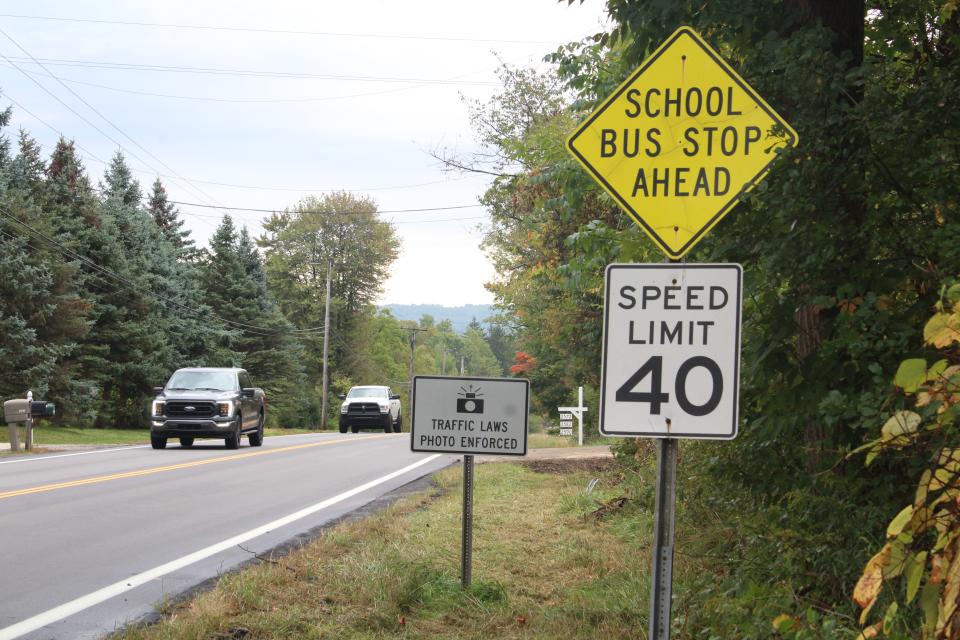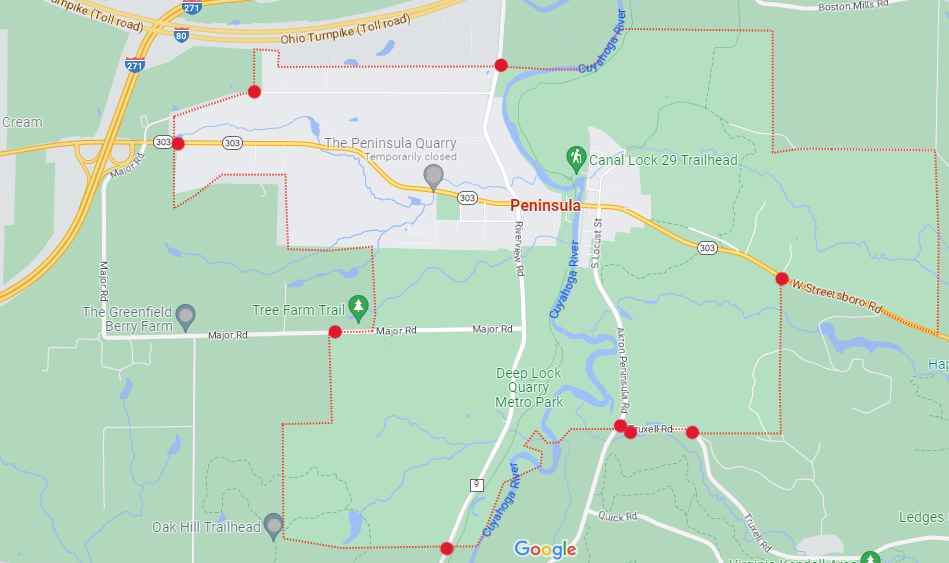Over half of Peninsula photo traffic tickets are unpaid. What happens to those drivers?

Ron Bercaw received a warning for speeding along state Route 303 earlier this summer while on his way to work in the village of Peninsula. He said he learned his lesson and hopes to stay ticket-free during his commutes from North Canton.
A co-worker, according to Bercaw, was not so lucky. He was issued a citation after a police officer snapped his photo using a handheld device as part of the Photo Enforcement Program, which penalizes motorists for driving 11 mph or more over the speed limit.
Traffic tickets: Peninsula police issued 8,900 traffic tickets since April, says speeding reduced
"It's better to have the handheld devices than have the police chasing people down who speed," Bercaw said. "I would like to see Peninsula be more welcoming of people instead of ticketing them and charging them to park."
His co-worker received one of at least 8,900 speeding tickets issued by the Peninsula Police Department since late April. A minimum of $1.3 million in fines have been levied on drivers so far.
Of that amount, about 4,000 have been paid, equaling $614,702, according to citation reports obtained by the Akron Beacon Journal. That's about 4,800 remaining unpaid citations.
How Peninsula's leaders view the program's rollout is not clear. Village Council meets at 7 p.m. Tuesday at Village Hall, 1582 Main St.
Peninsula Mayor Daniel Schneider Jr. did not reply to phone messages and an email seeking comment. Peninsula Police Chief Jay Nagy also declined to discuss the topic and referred the Akron Beacon Journal to Trevor Elkins, the director of the Peninsula Photo Enforcement Program.
How much money is Peninsula missing out on?
Peninsula splits the total revenue with Targeting and Solutions Limited, a third-party contractor that operates the Photo Enforcement Program. Peninsula receives 60% while Targeting gets 40% of revenue.
The village received about $369,000, roughly one-third of the projected 2023 village budget of $1.7 million, according to the village. Targeting received about $245,000.
Peninsula could be missing out on some $411,000 while the third-party company is losing nearly $273,000 in unpaid tickets.
What happens if a ticket goes unpaid?

Elkins, president of Targeting and Solutions Limited, said people could face financial and legal consequences if their unpaid tickets are sent to a collection agency that files a civil lawsuit.
If a judgment is found in favor of the collection agency, the motorist will be responsible for the late fees associated with the unpaid citation and the legal expenses including attorney fees, he said.
Civil suits are a final recourse to collect unpaid debt, according to the U.S. Consumer Financial Protection Bureau. If the creditor wins, a court order could give creditors the right to garnish wages.
Elkins said photo enforcement citations are considered civil citations, the same as parking tickets. Criminal charges cannot be filed if a motorist has multiple unpaid tickets from this program.
Could unpaid tickets affect credit scores?
Traffic tickets that end up in court, according to Elkins, can hurt credit scores because civil judgments and court-ordered wage garnishments are public information. The U.S. Consumer and Financial Protection Bureau and three nationwide credit bureaus paint a different picture.
Traffic tickets do not affect credit scores reported by the three largest nationwide credit bureaus — Experian, TransUnion and Equifax — but smaller credit agencies can use judgments and garnished wages to lower scores, according to a 2021 advisory opinion by the U.S. Consumer Financial Protection Bureau.
Judgments from civil lawsuits, tax liens and other public data do not appear in credit reports from the three big credit bureaus because of an agreement called the National Consumer Assistance Plan, said Tia Elbaum, a spokesperson for the U.S. Consumer Financial Protection Bureau.
Experian, TransUnion and Equifax signed onto the agreement that began in 2017, requiring them to remove and stop collecting items that did not include sufficient personal identifying information like name, address and social security number or date of birth, according to the Consumer Financial Protection Bureau. This includes traffic tickets.
The plan came after a settlement between these three major credit bureaus and over 30 state attorneys general in response to alleged Fair Credit Reporting Act violations, the CFPB reported in 2019.
Because the NCAP prevents the credit bureaus from collecting judgments, court-ordered garnishments do not appear on these credit reports, according to articles by Experian and Equifax.
Despite this agreement, other credit reporting agencies can and do include civil judgments and tax liens on consumer reports, the CFPB stated in an advisory opinion.
How to appeal and transfer a citation

To contest a photo enforcement citation, ticket recipients should visit the Stow Municipal Court website or call the court at 330-564-4148 to fill out an appeal application and submit a $100 fee. That fee is returned if the appellant wins the case.
This will be filed as a civil matter, according to the Stow Municipal Court website, so the individual filing the appeal will need to prove they were not involved in the traffic incident.
The process begins with a pre-trial, where the appellant can talk to the village attorney, followed by a trial.
Failure to attend the pre-trial or trial will result in the case being dismissed.
If the ticket recipient believes they were not operating the vehicle when the citation was issued, the vehicle owner can also contact the village to transfer liability of the citation, the court website states.
Peninsula allows registered vehicle owners to transfer citations to other individuals, according to the Peninsula Photo Enforcement website.
An affidavit form found on the enforcement website requires an individual to submit the application within 30 days of receiving the violation notice.
This article originally appeared on Akron Beacon Journal: What happens if motorists don't pay Peninsula photo speeding tickets?

